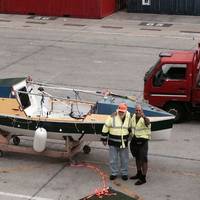Morocco
Hapag-Lloyd Cruises to name HANSEATIC inspiration
Hapag-Lloyd Cruises will hold the naming ceremony for its second expedition ship, the HANSEATIC inspiration on October 13, 2019 against the backdrop of the Belgian port city of Antwerp. It will be the first time in the city’s history that an ocean-going cruise ship has been christened in Antwerp. The announcement was made at lunchtime today by the CEO of Hapag-Lloyd Cruises, Karl J. Pojer, who spoke to invited representatives of the press and the Deputy Mayor of Antwerp, Koen Kennis. Once she has been christened, the HANSEATIC inspiration will set sail from Antwerp the following day for her 15-day maiden voyage to Tenerife. Karl J.
Fire Scare Aboard British Cruise Ship
The Boudicca, a Fred Olsen cruise liner, with more than 1,000 people on-board has been left without power off the coast of Morocco after an engine fire. Passengers of the U.K. based luxury cruise liner were terrified when a fire plunged it into darkness and they prepared to abandon ship. The Boudicca was sailing off the coast of Casablanca, Morocco at 4am on Sunday when the engine room caught alight. As the ship lost power and started to list the passengers were ordered to put on life jackets and assemble at emergency locations. However, it is now on the move again with three auxiliary engines and two main engines running.

Transatlantic Row to Encourage HIV Testing
Victor Mooney of Flushing, New York, reunited with his 24' rowboat christended the Spirit of Malabo over the weekend. Mooney and his vessel are currently at Pasito Blanco Yacht Club in Maspalomas, Gran Canaria, in the Canary Islands. The Canary Islands is an archipelago of islands located off the coast of Morocco in West Africa. After some technical installations and a favorable offshore forecast, Mooney will row 5,000 miles to Brooklyn, New York. The rower hopes his journey will encourage voluntary HIV testing.

Places of Refuge
The concept of force majeure has been broadly accepted since mariners initially encountered the perils of the sea. Persons and governments ashore have been obligated, at least by natural law, to accept and succor those in distress at sea. Concomitant with force majeure is the notion of providing a ship in distress with a place or port of refuge. A place of refuge is where a ship could go to avoid or ameliorate the peril and then depart at the earliest opportunity. While the original need for force majeure and a place of refuge was to reduce the risk to the lives of those on board the ship…
